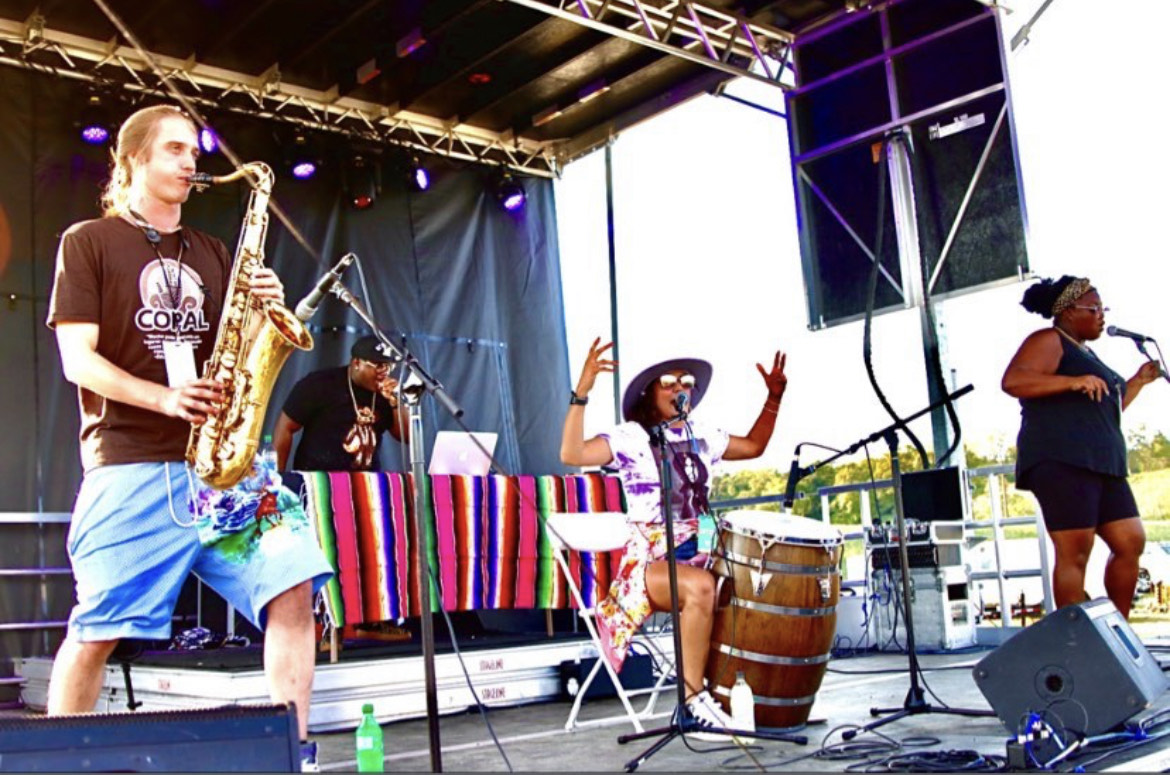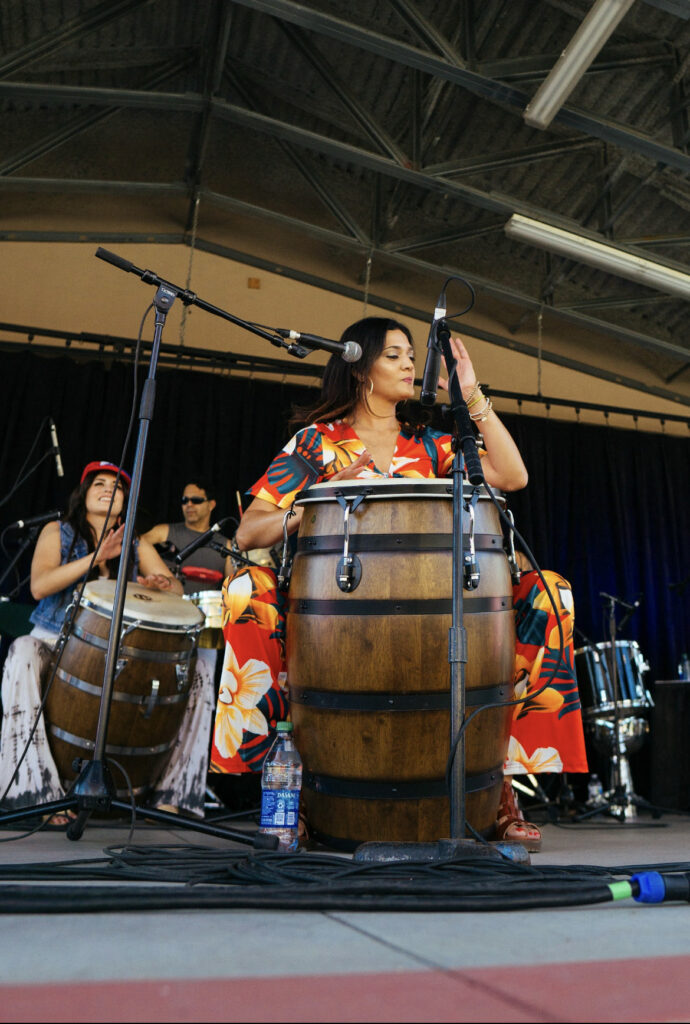María Isa – Music, Movement, and Soul
Looking out the window at El Cubano on St. Paul’s West Side, María Isa can point out nearly each house and tell you the story of who lived there. Isa is an international recording artist, cultural community organizer, youth worker and state representative candidate. But before she became the beloved artist and activist she is known for being today, Isa was a proud West Side kid growing up in the rich cultural traditions of her Boricua family.
Isa says she learned to care for her community by watching her parents, who were pioneers in bringing more Puerto Rican families to Minnesota and paved the way for more Latinos in the state.
“When my mom came here there were very few Puerto Rican families. You could fit them all on one hand and they all knew each other,” Isa recalled. “We became family – whether they were like blood or not.”
As she grew up, Isa says her home became a gathering point for Boricua families on the West Side, lovingly known by many as SotaRico. Her mom coordinated social services for Latinos in the neighborhood and worked hard to help them navigate a system that she says wasn’t built for them. While advocating for change wasn’t always easy, Isa says her family also had a lot of fun. She remembers her home being a place filled with good food, music and soul and often, she said, it was a place where many established artists would land in Minnesota.
“You could hear my parent’s barbeques. They would have the cousins bring the sound system and you’d have Tito Puente and Celia Cruz coming to your crib.” Isa remembered fondly. “As kids, that was normal to us and we knew our empowerment from it.”
As one of her first introductions into the arts Isa says her mom and aunt put her into tap dance classes as a little girl. But that didn’t last long. Her family was unimpressed by the lack of historical instruction and cultural context taught in the class. They were a proud Boricua family who wanted their children to know the rich cultural traditions and legacy of their ancestors. So instead, they opened El Arco Iris Center for the Arts, now known as the Boriken Cultural Center.
 María Isa performing, courtesy of SotaRico
María Isa performing, courtesy of SotaRico
At El Arco, Isa and her classmates of all backgrounds learned traditional Latin music styles and dances like cumbia, rumba and bomba. It was a safe place where Isa felt valued and loved and she was grateful for the opportunities she was given to grow as a young artist.
“We had mirrors on the walls, we had our culture around and it was our family, our friends and our community.” Isa said. “Whether it was bomba, rumba, Afro-Caribbean, folk or traditional, it cultivated me to be able to have a space to write and I started to take classes with all the padrinos in that space.”
But when she became a teenager, Isa wanted to do something new. She was growing up as hip hop was making a name for itself as a popular forward-thinking art form, and she wanted to be a part of the movement. But that meant leaving the safety of El Arco, and paving a way for herself on her own.
“When I started to put my music out there, there was no one else doing what I was doing,” Isa said. There were other Latinas doing music, but it was all in Spanish, or it was banda, salsa or jazz. They weren’t doing hip hop and they weren’t rapping. They weren’t trying to push up a whole new wave into space.”
As a young hip hop artist just starting out, Isa remembers the hustle it took to promote her work, be paid fairly or even sometimes just get the same opportunities that were offered to others in the local hip hop scene. But she says the reason that kept her going was that it wasn’t just about her. It was also about paving the way for her West Side community and showing other Latinos that they could do it too.
“Even if it was just me sticking a flier on the wall, I was doing it so that my people could say ‘Y’all, we all could get in there. Why don’t you start this band?’ or ‘Hey, you open up for me,’” Isa remembered. “It was really a circle of marketing. How did it feel when my face was on the cover of the top publication statewide? It was like, oh the whole neighborhood has it. They’re driving around with it, you know? So I’m going to stay in the studio and finish this album.”
For Isa, the struggle was worth it. She is now an internationally known hip hop artist who runs her own record label SotaRico Records, and released her latest EP, Outside with producer YMMI, this past spring. But even so, there are still challenges that come with being a Latina in hip hop. Isa says it’s important to her to create music that makes a difference. And as a single mom, she never stops working to earn an income and create the best life for her three-year-old daughter.
 “Becoming a mother and being an artist that lives off of her work, the challenges have grown so much. I’m not just providing for me anymore – I’m providing for my daughter,” Isa said. I’m not going to sacrifice the work I’m doing because that’s my job and that’s her world. She sees Mommy as an artist.”
“Becoming a mother and being an artist that lives off of her work, the challenges have grown so much. I’m not just providing for me anymore – I’m providing for my daughter,” Isa said. I’m not going to sacrifice the work I’m doing because that’s my job and that’s her world. She sees Mommy as an artist.”
In addition to raising her own daughter, Isa had been a long time mentor for young people in her community. She directs the mentorship program for the Twin Cities Mobile Jazz Project, which empowers young people through music and cultural curriculum. Isa also serves on the State of Minnesota Capitol Area Architectural and Planning Board Public Engagement Advisory Task Force to make the Capitol an inclusive space for all community members. And on top of it all, she is running for Minnesota House of Representatives to represent District 65B, which covers St. Paul’s West Side.
For Isa, what drives her the most is caring for her community. When she sees a problem, Isa refuses to stand by. It’s important for her to advocate for others, fight for fair treatment of women and BIPOC people and push for equal opportunity. Especially following the murder George Floyd, who Isa knew as a dear friend, she says being complacent is never an option for her. In 2020, Isa released “Como Duele,” a bomba dedicated to the memory of Floyd.
“[Floyd’s death] affected me personally, like it did to all of us. But having George and then having a daughter and also seeing white supremacy in your own neighborhood, on your own front steps, it’s just like ‘Wow, what are we doing here?’” Isa asked. There’s a fire going and I have an opportunity to help tame it.”
Back at El Cubano, Isa is packing up her things and is excited thinking about the next community event she and her daughter will stop by before the day ends. Then she’ll head back to her home to the West Side and do it all over again the next day. Even though it can be tiring at times, Isa says she will never stop working to celebrate her community and that she’ll always be a West Side kid at heart.
“Where there is movement there is music and there is soul.”
About the author: Simone Cazares is a St. Paul based reporter and producer. She enjoys exploring the Twin Cities arts scene and learning about all things local.
